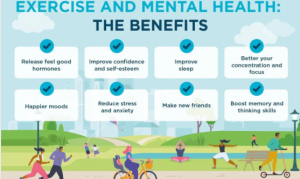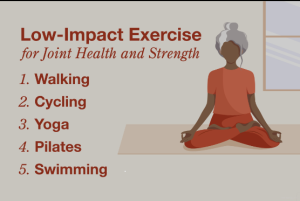Introduction to Exercise and Health
- Introduction to Exercise and Health
- Importance of regular exercise
- Overview of the impact of exercise on health
- Physical Health Benefits of Exercise
- Cardiovascular health improvement
- Weight management
- Strengthening bones and muscles
- Boosting immune function

- Mental Health Benefits of Exercise
- Reduction of stress and anxiety
- Improvement in mood
- Boost in self-esteem and confidence
- Prevention of cognitive decline
- Social Benefits of Exercise
- Opportunity for social interaction
- Building a sense of community
- Encouraging teamwork and cooperation
- Exercise and Disease Prevention
- Lowering the risk of chronic diseases
- Management of conditions like diabetes and hypertension
- Tips for Incorporating Exercise into Daily Routine
- Setting realistic goals
- Finding enjoyable activities
- Creating a consistent schedule
- Overcoming Barriers to Exercise
- Lack of time
- Physical limitations
- Motivational challenges
- Conclusion
Introduction to Exercise and Health
Regular exercise is often hailed as a cornerstone of a healthy lifestyle. It encompasses various physical activities aimed at improving or maintaining one’s physical fitness and overall well-being. The impact of exercise on health is profound, influencing not only physical but also mental and social aspects of our lives.
Physical Health Benefits of Exercise
Cardiovascular Health Improvement
Engaging in regular physical activity significantly reduces the risk of cardiovascular diseases. Exercise helps in strengthening the heart muscle, improving circulation, and lowering blood pressure and cholesterol levels.
Weight Management
Exercise plays a crucial role in weight management by burning calories and increasing metabolism. It helps in shedding excess weight and maintaining a healthy body mass index (BMI), reducing the risk of obesity-related conditions such as diabetes and heart disease.
Strengthening Bones and Muscles
Weight-bearing exercises like walking, running, and strength training contribute to stronger bones and muscles. This is especially important in preventing osteoporosis and reducing the risk of fractures and falls, particularly in older adults.
Boosting Immune Function
Regular moderate-intensity exercise has been shown to boost the immune system, reducing the risk of infections and illnesses. It enhances the production of antibodies and white blood cells, improving the body’s ability to fight off pathogens.
Mental Health Benefits of Exercise
Reduction of Stress and Anxiety
Exercise is a natural stress reliever, stimulating the production of endorphins, which are chemicals in the brain that act as natural painkillers and mood elevators. Physical activity helps in reducing levels of stress hormones like cortisol, alleviating anxiety and promoting relaxation.
Improvement in Mood
Regular exercise is associated with improved mood and overall emotional well-being. It triggers the release of neurotransmitters like serotonin and dopamine, which are known to enhance feelings of happiness and contentment.
Boost in Self-esteem and Confidence
Achieving fitness goals and experiencing improvements in physical appearance through exercise can significantly boost self-esteem and confidence. Regular physical activity fosters a positive body image and a sense of accomplishment.
Prevention of Cognitive Decline
Exercise has been linked to a lower risk of cognitive decline and dementia in older adults. It promotes neuroplasticity, the brain’s ability to form new connections and adapt to changes, thereby preserving cognitive function.
Social Benefits of Exercise
Opportunity for Social Interaction
Participating in group fitness classes, sports teams, or outdoor activities provides opportunities for social interaction and networking. Exercise can be a shared experience, fostering friendships and camaraderie.
Building a Sense of Community
Engaging in community-based exercise programs or joining local sports clubs contributes to a sense of belonging and community cohesion. It promotes social integration and support networks.
Encouraging Teamwork and Cooperation
Team sports and group exercises teach valuable lessons in teamwork, cooperation, and leadership. Working towards common goals and supporting teammates fosters a sense of unity and cooperation.
Exercise and Disease Prevention
Regular physical activity is instrumental in preventing a wide range of chronic diseases, including cardiovascular diseases, diabetes, cancer, and osteoporosis. It helps in managing existing conditions and reducing the risk of complications.
Tips for Incorporating Exercise into Daily Routine
Setting Realistic Goals
Start with achievable goals and gradually increase the intensity and duration of exercise as fitness improves. Setting SMART (Specific, Measurable, Achievable, Relevant, Time-bound) goals ensures success and motivation.
Finding Enjoyable Activities
Choose activities that you enjoy and look forward to. Whether it’s walking, cycling, swimming, dancing, or playing sports, finding enjoyable forms of exercise increases adherence and long-term sustainability.
Creating a Consistent Schedule
Make exercise a regular part of your daily routine by scheduling it at a specific time and sticking to it. Consistency is key to reaping the long-term health benefits of exercise.
Overcoming Barriers to Exercise
Lack of Time
Prioritize exercise by incorporating it into your daily schedule. Break down workouts into shorter sessions if time is limited, and consider incorporating physical activity into everyday tasks, such as taking the stairs instead of the elevator.
Physical Limitations
Adapt exercises to accommodate any physical limitations or injuries. Consult with a healthcare professional or certified trainer for guidance on safe and suitable exercises for your individual needs.
Motivational Challenges
Stay motivated by setting clear goals, tracking progress, and rewarding yourself for achievements. Find a workout buddy or join exercise classes for social support and accountability.
Conclusion
The impact of exercise on health extends far beyond physical fitness, encompassing mental, emotional, and social well-being. By incorporating regular physical activity into our daily lives and overcoming barriers to exercise, we can enjoy improved health, longevity, and overall quality of life.
FAQs (Frequently Asked Questions)
- How much exercise is recommended for optimal health?
- The World Health Organization recommends at least 150 minutes of moderate-intensity aerobic activity or 75 minutes of vigorous-intensity aerobic activity per week, along with muscle-strengthening activities on two or more days a week.
- Can exercise help in managing chronic conditions like diabetes and hypertension?
- Yes, regular exercise plays a crucial role in managing chronic conditions by improving blood sugar control, lowering blood pressure, and reducing the risk of complications.
- What are some effective ways to stay motivated to exercise regularly?
- Setting realistic goals, finding enjoyable activities, seeking social support, and tracking progress are effective strategies for staying motivated to exercise regularly.
- Are there any risks associated with exercising too much?
- Excessive exercise without adequate rest and recovery can lead to overuse injuries, fatigue, and burnout. It’s important to listen to your body and balance exercise with rest and recovery.
- Is it necessary to consult a healthcare professional before starting an exercise program?
- If you have any underlying health conditions or concerns, it’s advisable to consult with a healthcare professional or certified fitness trainer before starting an exercise program to ensure safety and suitability.





